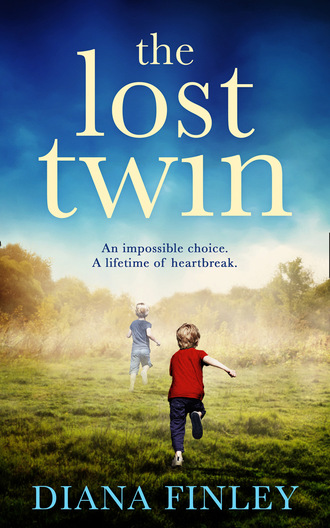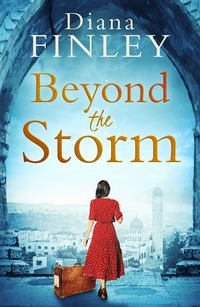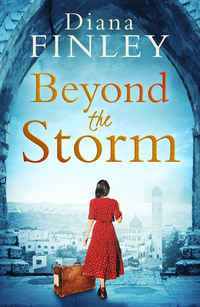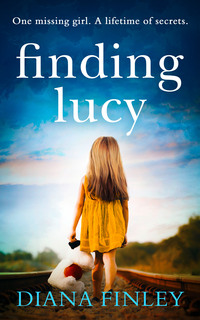
Полная версия
The Lost Twin

About the Author
Diana was born and grew up in Germany, where her father was a British Army officer. After a move to London, at eighteen, Diana spent a year living with nomadic people in the remote Pamir mountains of Afghanistan – an experience about which she wrote several stories and accounts. These helped secure her first job, as a copywriter and then as writer and editor of children’s information books for Macdonald Educational Publishers.
A move to North East England meant changing direction. Diana took a degree in Speech and Psychology, and worked for many years as a Specialist in Autism, publishing a professional book on that subject. In 2011 she completed an MA in Creative Writing with distinction at Newcastle University. In 2014 her debut novel, The Loneliness of Survival, a moving family saga, was published. It is now published by HQ Digital, HarperCollins, under the title Beyond the Storm, as is her second novel, Finding Lucy. The Lost Twin is her third book.
Praise for Diana Finley from readers:
‘A thought provoking read’
‘Couldn’t put this book down’
‘I found myself eagerly turning the pages’
‘An enthralling tale of love, hatred, secrets and joy’
‘I absolutely drank it all in and wished there was more’
‘Captivating from beginning to end … the characters were beautifully drawn’
‘Diana Finley is perceptive in her character building and of domestic and everyday situations’
Also by Diana Finley
Finding Lucy
Beyond the Storm
The Lost Twin
DIANA FINLEY

HQ
An imprint of HarperCollinsPublishers Ltd.
1 London Bridge Street
London SE1 9GF
First published in Great Britain by HQ in 2020
Copyright © Diana Finley
Diana Finley asserts the moral right to be identified as the author of this work.
A catalogue record for this book is available from the British Library.
This novel is entirely a work of fiction. The names, characters and incidents portrayed in it are the work of the author’s imagination. Any resemblance to actual persons, living or dead, events or localities is entirely coincidental.
All rights reserved under International and Pan-American Copyright Conventions. By payment of the required fees, you have been granted the non-exclusive, non-transferable right to access and read the text of this e-book on-screen. No part of this text may be reproduced, transmitted, downloaded, decompiled, reverse engineered, or stored in or introduced into any information storage and retrieval system, in any form or by any means, whether electronic or mechanical, now known or hereinafter invented, without the express written permission of HarperCollins.
E-book Edition © Diana Finley 2020 ISBN: 9780008297756
Version: 2020-08-08
Table of Contents
Cover
About the Author
Praise for Diana Finley from readers
Also by Diana Finley
Title Page
Copyright
Dedication
Chapter 1
Chapter 2
Chapter 3
Chapter 4
Chapter 5
Chapter 6
Chapter 7
Chapter 8
Chapter 9
Chapter 10
Chapter 11
Chapter 12
Chapter 13
Chapter 14
Chapter 15
Chapter 16
Chapter 17
Chapter 18
Chapter 19
Chapter 20
Chapter 21
Chapter 22
Chapter 23
Chapter 24
Chapter 25
Chapter 26
Chapter 27
Chapter 28
Chapter 29
Chapter 30
Chapter 31
Chapter 32
Chapter 33
Chapter 34
Chapter 35
Chapter 36
Chapter 37
Chapter 38
Chapter 39
Chapter 40
Chapter 41
Chapter 42
Chapter 43
Chapter 44
Chapter 45
Chapter 46
Chapter 47
Acknowledgements
Extract
Dear Reader …
Keep Reading …
About the Publisher
For my wonderful family, especially Terence, who encouraged and supported me through all the ups and downs.
Chapter 1
1970
Marie
‘Push, girl! Push!’ Sister Bernadette growls like an angry bear, gripping my left leg so tightly her bony fingers press painfully into my thigh. It feels as though I’m being tortured. What am I doing here? I want my ma. How could this possibly be happening? God, how I want my mother. What would she say to this …? What would she say to me? No, maybe I don’t want my mother.
‘Oh, oh, you’re hurtin’ me, Sister,’ I can’t help gasping with the pain.
‘Don’t make such a fuss, girl! Whose fault is it you’re in this mess – you tell me that, you little whoor?’
I turn my head to the right, away from the furious hostility of Sister Bernadette, to look at Sister Aileen’s face. It’s a gentler, kinder face – a soft, rosy-cheeked face. Right now I feel in great need of kindness.
‘Sure now, you’re nearly there, Marie,’ Sister Aileen says quietly. ‘Just a few more good pushes, girl, when the contractions come, and it’ll all be done, thank the Lord.’
I try to focus on the woman’s face, her smile, her soft brown eyes, gentle as a fawn’s. But the pain is fair tearing me apart and I can’t concentrate on anything. Another contraction grips my whole body like a vice. I let out a long, agonised scream. I can’t help it. The sound of it fills the room, echoing as though the very walls are screaming back at me.
‘Ahhhhh! It’s killin’ me! Sisters, can you not give us something to take the pain away? Oh God, oh God, oh God!’
I arch my back and try to lift the great swell of my belly off the bed. Sister Bernadette’s furious face, all screwed up in anger, descends on me. She yanks my leg fiercely up and back.
‘You stop that, you wicked girl! Taking the Lord’s name in vain! The pain’s your punishment for what you’ve done – and fair punishment it is too, to be sure. There’s nothing will take that pain away, Marie Tully. Likely you’ll have it for the rest of your life, and rightly so. You deserve it.’
As Sister Bernadette bends close and hisses those words at me, tiny drops of her spit strike my face like vicious little bullets. The look she gives me is one of total disgust, and her grip on my thigh tightens further still.
‘Now, open your legs and push the poor little bastard out! You were happy enough to open them to get it in there.’
Sister Aileen tuts softly. She wipes my face with a flannel and gently pushes the damp hair back from my forehead. Then she moves down the bed to examine me, peering under the sheets.
‘Nearly there now, Marie – I can see babby’s head! Ooh, here it comes now … yes, the head’s nearly out … just another push, dear … yes, oh yes … here it is!’
I feel an intense burning sensation and a primaeval scream bursts out of me. A moment later a shudder goes through my whole body, and then … a sudden feeling of great release.
Slowly, slowly, the pain subsides. Sister Aileen is gently easing the baby out. It slithers onto the waiting towel like a slippery, wet fish, with no effort on my part.
‘It’s a boy! You have a beautiful little son, Marie!’ exclaims Sister Aileen, smiling broadly.
‘Hmmph! I don’t know about beautiful,’ says Sister Bernadette with a scowl. ‘He looks scrawny as a rabbit, considering the girl’s been the size of a battleship these last weeks!’
She takes the baby roughly and rubs him with the towel. He splutters, sneezes and then finally gives a thin wail that brings tears to my eyes.
‘Oh, he’s crying! Oh poor little baby. Be gentle with him, Sister, please. Oh please pass him to me! Just let me hold him.’
I try to reach for him, but just then my entire body is consumed by a further spasm of pain.
‘Aaah, no more! Please make it stop, Sister. I can’t stand no more!’
Sister Aileen lifts the sheet again. Her soft hands gently feel all over my swollen abdomen. ‘My, but there’s another one coming! It’s no wonder you were so big, Marie – you’re after having twins, girl!’
‘Twins …?!’ Sister Bernadette huffs and tuts, her brow furrowed with disapproval, as if producing two illegitimate babies is twice the sin of one.
Thank the Lord, the second baby is born much more quickly than the first. A few more contractions and it’s out.
‘Another boy,’ Sister Bernadette announces. ‘Even skinnier than the first one. Get the girl cleaned up now, Sister Aileen, and then put the infants to the breast. There’ll be no milk yet of course, but let them suck anyway. Get them used to it. They’ll need feeding up, and we’ll not waste good bought, powdered milk on them, not if it can be helped. Sure, we’ll need to get them looking a deal bonnier if anyone’s going to want to adopt them!’
Sister Bernadette stomps out of the birthing room and it’s as if the sun has suddenly come out. I’m holding both my darling babies close, one nestled in each arm. As I bend over to each side to kiss my sons, tears spill down my cheeks.
‘I don’t want them to be adopted, Sister Aileen!’ I wail. ‘I want to look after them … if I can.’
I hug them to me protectively.
‘My wee children … you’re beautiful, so beautiful … my beautiful boys. I don’t want to give them up.’
Sister Aileen looks at me and shakes her head sympathetically. ‘You’re not much more than a child yourself, are you, Marie?’
‘I’m nearly eighteen. I’m not a child.’
Sister Aileen sighs. She leans down and kisses my forehead. ‘Will your family help you, dear?’
‘Me ma, back in Ireland, knows. She was right mad when she found out I was expecting. Said she’d do what she could to help, but only if I gave it up. ’Course we didn’t know there were two of them then. I can’t ever go home though. Me da doesn’t know. Ma said he’d kill us. She’s the one gave me some money for to come here to London. Said there was plenty of people wanting a baby. But I can’t! I can’t give up my own child … my own children, Sister. That’s why I’m come here to St Agatha’s, when I heard there was this mother and baby home in London. What am I going to do, Sister Aileen? How am I to care for two babies?’
Chapter 2
1970
Marie
My feet ache something terrible from trudging the streets to Kentish Town Council Housing Office. It seems to be miles. My thin shoes are wet through. In the cold, the damp leather has chafed the bare skin of my feet, rubbing it raw in places. I’ve no socks or stockings. Rain dribbles from my hair, soaking through my collar, gathering in a freezing rivulet on my neck and back.
Never mind, I tell myself, trying to be brave, the Housing Office will make sure we have a roof over our heads and a bed to sleep in tonight. I pull the baby blanket closely around Barry, and tuck him further inside my gaberdine coat. He’s wedged in on my right side. There’s a sad space on the left. I’d shoved a jumper down to try to fill it. It’s where Donal should be.
At last we get to the council offices. It’s a dreary, forbidding scene. Barry’s screaming by now, wailing at the top of his voice; he must be hungry, as well as cold. The official sits unsmiling behind his desk, while I stand, holding the baby. No chair for me.
The man raises his eyebrows at the sound of the baby crying, and sighs wearily. He looks at me like I’m dirt.
‘The baby’s hungry,’ I explain. ‘He’s crying because he’s hungry. Is there somewhere I could feed him?’
‘This isn’t a bleeding nursery, love,’ he says. ‘If you want somewhere to stay tonight, we’ve got to get on with filling in this form. You can go outside somewhere now and feed the baby if you want, but then you’ll risk losing this bedsit and it’s the last one I’ve got on my books. Your choice. There’s plenty more folks needing accommodation; you’re not the only girl looking for somewhere to stay in London, I can tell you.’
He glares at me.
‘No, please, mister, I really need this room,’ I say. ‘Please, hurry up and finish the form.’
‘Now you look here, missy, don’t you take that tone with me! I’ll finish the form when it’s finished and not before. You girls don’t know how lucky you are; having babies left, right and centre, and expecting the welfare state to support you. There’s no gratitude in this country no more, no appreciation at all.’
‘Oh no, I am grateful, mister, really I am. I’m just worried about the baby.’
‘Yeah well, the sooner we get this done the sooner you can take the sprog away, and we might all have some peace.’
***
When the forms are finally complete, I thank him and leave. Barry is still howling. A few bedraggled people, mostly women, are sitting on a bench in the corridor, waiting to be seen, to be granted some sort of support from the council. Their eyes follow me enviously as I hurry for the door, clutching my precious piece of paper.
‘It’s all right for you,’ their eyes seem to say. ‘You’ve got through this nightmare; you’ve got your permit …’
Outside, I struggle to arrange Barry inside my coat while holding the carrier bag containing our few possessions – I don’t dare put it down. The main thing is I’ve now got the housing token and the address.
We aren’t allowed to go to the house until six in the evening when the landlord will be there to let us in. That means another two hours of tramping about in the cold and wet. It’s already starting to get dark. I’m exhausted, but never mind, it doesn’t look too far to walk to the accommodation, thank God. The man from the council had shown me on a street map. Maybe under his rough exterior he did have some sympathy.
I’m feeling faint. I’ve had nothing to eat since breakfast, and that was just a crust of bread. I know I have to eat or my milk might dry up – and I can’t risk fainting while carrying Barry. Maybe I can find somewhere to shelter and keep warm while we wait for six o’clock.
Kind Sister Aileen had given me five pounds ‘just to tide you over, my dear girl’, when I set off from St Agatha’s, but now I’ve only a few coins left, after paying a week’s rent at the hostel, and buying a bit of food. I don’t know when – or how – I might be getting some more money. There’s an ‘emergency fund’ but I’d have to go back to the council tomorrow and fill out another form to apply for that – there were too many other people waiting, and the office was due to close soon. The idea of standing in that queue of hungry-eyed people yet again, for a meagre hand-out, fills me with dread. I decide I’d better try to find something cheap to eat – if anywhere in London is cheap.
I set off in what I hope is the right direction for the accommodation. It’s an area of small, closely built terraced houses. Some of them look quite old and shabby. After a while I notice the lights of a row of small shops. It looks – and smells! – welcoming. I can see a baker’s shop that appears to be open. We head straight for it and as I step through the door a beautiful fragrance of fresh, hot bread wafts towards me, making my stomach growl with anticipation. The wonderful warmth envelops me and I hug Barry close. A plump, middle-aged woman with a kind face is standing behind the counter. She smiles at me.
‘Hello, my love, nasty night, ain’t it? What can I do for you?’
‘May I just have a quick look at what you’ve got …?’
I hastily scan the price labels of the items in the glass counter in front of me, comparing them with the scant coins in my palm.
‘’Course you can, love. You just take your time – no rush.’
Barry is whimpering and snuffling now, too exhausted to scream. He squirms restlessly inside my coat.
‘Oooh, is that a baby you’ve got in there? Ahh, bless him, let me see …’
At the sudden unexpectedly kind tone of the woman’s words, I almost begin to cry. Sniffing, I open my coat and reveal the tiny, red, protesting face of my son. The woman hurries around to the front of the counter and takes him from my arms.
‘Oh, he’s gorgeous!’ she croons. ‘What’s his name?’
I can’t hold back my tears any longer. ‘Barry.’ I gulp. ‘He’s called Barry. Oh, I’m sorry, I’m sorry. You’re being so kind. No one else has said nice things to me, not for days and days. It’s just that he’s hungry and I need to feed him, and they wouldn’t let me at the council, and we’re getting a room from the council, but we can’t go there yet … so … so … could I please just have a bread roll? I think I’ve got enough for that.’
‘Oh, you poor love. They’re miserable bastards at that Housing Office, aren’t they? Anyone’d think they was giving you their own house! ’Course you can have a bleedin’ bread roll, love.’ She stands rocking the baby and looking at me. I’m sobbing softly by now.
‘Now, I was just about to close up, so you come through the back and get warmed up, darlin’. You’re wet through, and you look frozen half to death. And this little fella’s got a wet bum. I’m gonna make you a nice hot cup of tea and you can feed baby Barry, and put a clean nappy on him. I’m Sylvia by the way. What’s your name, dear?’
‘Ma-a-rie …’ I sniff.
‘Marie? That’s a lovely name.’
Sylvia bustles me into the room behind the shop: a narrow kitchen with a plain wooden table and two chairs set against the wall.
‘Sit down, Marie love. Have you got any dry nappies?’
I shake my head, tears running down my cheeks.’
‘No,’ I sob, ‘I’ve only got four, and they’re all wet. I’ve not had anywhere to wash or dry them.’
She shakes her head. ‘Oh dearie me. Not to worry. You feed the baby. Then I’ll change him for you. I know I’ve got some old towels out the back, what we can cut in half for a nappy. I know what it’s like to care for a baby when you’re on your own, with no money, believe me. No, it ain’t easy when there’s no man about to help you. Not that they’re much bleedin’ help, are they, love? Once they’ve done their bit, they’re quite happy to bugger off and leave you to it.’
Sylvia bustles about in the cramped kitchen, while I feed Barry. He sucks rhythmically at my breast. What bliss to sit down. I feel the warmth of the room wrap itself gently around me and close my eyes.
***
The next thing I know, Sylvia has put a plate in front of me and is gently squeezing my shoulder. Barry, warm and fed, is fast asleep in my arms, his mouth slack.
‘Here, give the baby to me, love, and get stuck into this – it’s a steak pie and some mash an’ gravy – nice and hot. Do you good, it will. A lot better than a miserable old bread roll, eh love? And there’s some lovely hot tea for you as well. I’ve put two sugars in, for energy. You look like you need it. Now just get that lot down you.’
Sylvia takes Barry, washes and changes him, and then sits down cuddling him on her lap, rocking him back and forth slowly. She watches me as I finish eating, shaking her head.
Relaxing now in the warmth, I remember the good friend I made at St Agatha’s – Elsie – and her warning to me as we chatted in the cold yard of the home, our three babies bundled up in a blanket between us, like a row of sausage rolls.
I tell my new friend – Sylvia – what Elsie had said.
‘You do know they’ll never let ya keep them, don’cha? Not when your mum and dad won’t ’ave them in the ’ouse.’
‘They’re mine; they’re my babies, Elsie. They can’t take them off us. You’re allowed to keep your Milly, aren’t you?’
‘Yeah, but that’s just ’cos me mum said she’d support me and the baby. And ’cos me mum’s just down the road in Shoreditch, not away off in Ireland like yours. They’ll not let the likes of you keep them, Marie, not on your own. Anyway, they get a “donation” off the adopting parents, don’t they? Sister Bernadette will make effin’ sure she gets ’er money, I betcha.’
We gazed at our babies in silence for a minute.
‘Mebbe they’ll let you keep one of them,’ mused Elsie. ‘You said you’ve got the milk to feed one at least.’
‘They’re twins, Elsie. They can’t separate twins … can they?’
‘They can do what they flippin’ want. They’re the ones in charge around ’ere. We’ve got no power, no power at all.’
***
It’s dark as I step out into the street again. I turn and give Sylvia a hug.
‘Thanks for everything, Sylvia. You’ve been so generous and kind – how can I ever repay you?’ Tears threaten to flood from my eyes again.
‘Never mind all that, darling … it’s nothing, really. Now, are you sure you know the way to Bailey Street? It’s no more than ten minutes’ walk. Just round that corner, turn left and then right by the post box. And don’t forget where your old Auntie Sylvia is, will you, love? I expect to see you and this young man in the next day or two anyway, but you just come straight back now if there’s anything you need – or if there’s any problem, anything at all.’
I smile to myself as I walk along. Life isn’t so bad after all. Barry and I have full stomachs, a place to stay for the next two weeks, and I’ve made a lovely new friend. If only … no, I remember how Elsie had told me never to dwell on the ‘if onlys’. She was right. I’d done the right thing, hadn’t I? I’d made the right decision? Well, I didn’t have a choice; it was the only decision I could make.
***
Thanks to Sylvia’s instructions I soon find Bailey Street. It’s a long, narrow row of small terraced houses, with another identical row opposite. Most of the houses look a bit shabby and neglected; paint peeling from the doors and window frames. I walk along the side with even numbers, looking for number 22. It doesn’t take long. The front door on this house could certainly do with a fresh coat of paint. The windows could do with a wash too! There’s no bell so I knock loudly on the door. It’s opened by a thin, unshaven man in his forties. He frowns fiercely at me.
‘Yes?’
‘Er … Mr Finch?’ I say hesitantly. ‘I was told you have a room. I’ve come from the Housing Office. Marie Tully’s my name.’
I wave the housing token I’d been given by the Housing Office in front of the man’s face.
‘Oh yeah. Well, you’re late,’ he says, squinting at the token.
‘Oh, I’m very sorry if I’m later than you expected, Mr Finch. They told me not to arrive before six o’clock.’
‘Yeah? Don’t know why they said that. Tell you anything they like, that lot. Anyway, it’s OK – you better just come on in, love. Wipe yer feet. It’s a devil keeping the floor clean; there’s that much coming and going.’
The grey, threadbare carpet is indeed heavily stained. Narrow stairs rise steeply straight ahead of the front door, beside which an even narrower, gloomy passage leads to the back of the house. I notice what looks like a tiny kitchen at the far end.





